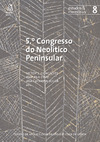Identificador persistente para citar o vincular este elemento:
https://accedacris.ulpgc.es/jspui/handle/10553/59974
| Campo DC | Valor | idioma |
|---|---|---|
| dc.contributor.author | Peña Chocarro, Leonor | en_US |
| dc.contributor.author | Pérez Jordà, Guillem | en_US |
| dc.contributor.author | Morales Mateos, Jacob | en_US |
| dc.contributor.author | Ruiz Alonso, Mónica | en_US |
| dc.contributor.author | Simón Vallejo, María D. | en_US |
| dc.contributor.author | Cortés Sánchez, Miguel | en_US |
| dc.date.accessioned | 2019-12-20T16:03:34Z | - |
| dc.date.available | 2019-12-20T16:03:34Z | - |
| dc.date.issued | 2015 | en_US |
| dc.identifier.isbn | 978-989-99146-1-2 | en_US |
| dc.identifier.other | Dialnet | - |
| dc.identifier.uri | https://accedacris.ulpgc.es/handle/10553/59974 | - |
| dc.description.abstract | Se presentan los primeros datos arqueobotánicos neolíticos de varios yaci-mientos malagueños (Cueva de Nerja, Hotel Guadalupe y Roca Chica). De la Cueva de Nerja se han estudiado materiales de las antiguas excavaciones de los años 1960 y 1970, mien-tras que en el caso de Hotel Guadalupe y Roca Chica, los materiales analizados proceden de actuaciones más recientes. El estudio arqueobotánico ha permitido establecer las espe-cies cultivadas por los primeros agricultores de la región que incluyen entre otras la cebada desnuda, el trigo desnudo, la escanda menor así como varias leguminosas como el haba, los guisantes y las almortas/titarros. Entre las especies silvestres destacan las aceitunas y las bellotas. | en_US |
| dc.description.abstract | This paper presents the first archaeobotanical results from Neolithic sites in Málaga province (Cueva de Nerja, Hotel Guadalupe y Roca Chica). The material studied from Cueva de Nerja comes from the ancient excavations from the 60’s and 70’s whereas that from from Hotel Guadalupe and Roca Chica was recovered in most recent times. The archaeobotanical study has allowed defining the main cultivated species in the area which include amongst others, naked barley, free-threshing wheats, emmer as well a vari-ous legumes such as broad beans, peas, and grass pea. Wild plants are represented by olives and acorns. | en_US |
| dc.language | spa | en_US |
| dc.source | 5.º Congresso do Neolítico Peninsular. Actas: Faculdade de Letras da Universidade de Lisboa, 7-9 abril 2011, p. 36-43 | en_US |
| dc.subject | 550405 Prehistoria | en_US |
| dc.subject.other | Arqueobotánica | en_US |
| dc.subject.other | Neolítico | en_US |
| dc.subject.other | Málaga | en_US |
| dc.subject.other | Archaeobotany | en_US |
| dc.subject.other | Neolithic | en_US |
| dc.title | Orígenes de la agricultura en la provincia de Málaga: datos arqueobotánicos | en_US |
| dc.type | info:eu-repo/semantics/bookPart | en_US |
| dc.type | BookPart | en_US |
| dc.identifier.url | http://dialnet.unirioja.es/servlet/articulo?codigo=5412400 | - |
| dc.description.lastpage | 43 | - |
| dc.description.firstpage | 36 | - |
| dc.investigacion | Artes y Humanidades | en_US |
| dc.type2 | Capítulo de libro | en_US |
| dc.contributor.authordialnetid | No ID | - |
| dc.contributor.authordialnetid | No ID | - |
| dc.contributor.authordialnetid | 313915 | - |
| dc.contributor.authordialnetid | No ID | - |
| dc.contributor.authordialnetid | No ID | - |
| dc.contributor.authordialnetid | No ID | - |
| dc.identifier.dialnet | 5412400ARTLIB | - |
| dc.identifier.ulpgc | Sí | es |
| item.grantfulltext | open | - |
| item.fulltext | Con texto completo | - |
| crisitem.author.dept | GIR Investigación en Arqueología y Patrimonio | - |
| crisitem.author.dept | Departamento de Ciencias Históricas | - |
| crisitem.author.orcid | 0000-0002-6781-2121 | - |
| crisitem.author.parentorg | Departamento de Ciencias Históricas | - |
| crisitem.author.fullName | Morales Mateos, Jacob Bentejui | - |
| Colección: | Capítulo de libro | |
Visitas
234
actualizado el 15-ene-2026
Descargas
88
actualizado el 15-ene-2026
Google ScholarTM
Verifica
Altmetric
Comparte
Exporta metadatos
Los elementos en ULPGC accedaCRIS están protegidos por derechos de autor con todos los derechos reservados, a menos que se indique lo contrario.
